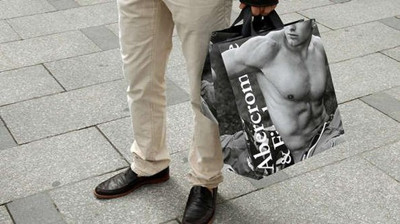(单词翻译:单击)
中英文本
Religious discrimination
种族歧视
Dress codes
着装要求
Can a Muslim woman be denied a job because of her headscarf?
穆斯林妇女就该因为头巾而遭遇求职被拒吗?
SAMANTHA ELAUF, a young Muslim woman, did well in her interview for a job at a children's branch of Abercrombie & Fitch, a casual-clothing store, in Tulsa, Oklahoma. But when the interviewer told a manager about Ms Elauf's black headscarf, she was instructed to lower the applicant's “appearance” score and deny her the job. According to the company's “look policy”, employees must align their dress with the “preppy look of the Ivy League” and must not wear “caps” or black clothing. In fact Abercrombie is best-known for the half-naked (but preppy) hunks that adorn its shopping bags.
萨曼莎·埃劳夫是一名穆斯林少女,曾在Abercrombie & Fitch休闲服装公司(位于奥克拉何马州吐桑市)的童装分公司面试中表现不错。然而,当面试者和经理谈起埃劳夫小姐的黑色头巾时,埃劳夫小姐的“形象分”便大打折扣,而且她的求职也被拒绝了。根据该公司的“外貌政策(look policy)”,雇员着装要求必须符合“常青藤学院派风格”,不能戴“帽子”,不能穿黑色衣服。事实上,A&F公司却是因印刷在购物袋上半裸(但具学院风)的大块头而闻名于世。

Ms Elauf turned to the Equal Employment Opportunity Commission (EEOC), which sued the store on her behalf. A federal district court in Oklahoma ruled that in refusing to hire Ms Elauf because of her religious practice, Abercrombie had violated Title VII of the Civil Rights Act of 1964. On appeal, the Tenth Circuit Court held for the company. If Ms Elauf wanted a religious accommodation, the appeals court said, she should have asked for it.
埃劳夫小姐向公平就业机会委员会(EEOC)求助,该委员会代表她起诉了A&F。奥克拉荷马州的联邦地区法院裁决,A&F公司因宗教习俗而拒绝雇佣埃劳夫小姐,违反了1964年《民权法案》第七章条例。经过上诉,第十巡回法院适用该公司。如果埃劳夫小姐想要一个宗教住房,上诉法庭表示她应该申请一个的。
On February 25th the Supreme Court heard arguments in the case. The chief justice, John Roberts, worried that the EEOC's view would lead an interviewer to grill a bearded applicant with a “Middle Eastern appearance” about possible “religious reasons” for his facial hair while asking no other applicants about grooming. “It seems that your solution causes more problems,” he told the government's lawyer.
2月25日,最高法院主张对案件开辩论庭。公平就业机会委员会(EEOC)的观点会促使面试者对有着“中东外貌”、长满胡子的求职者进行“严刑拷问”,内容包括与他的脸部毛发相关的“宗教原因”,相比之下此类美容问题不会问及其他求职者;首席大法官约翰·罗伯茨对此表示担忧。“看起来,你的解决之道招致更多麻烦,”他对政府律师说道。
The toughest question for the other side came from Justice Samuel Alito, author of a decision earlier this term protecting the right of a Muslim inmate to grow a beard. Imagine that “a Sikh man wearing a turban”, “a Hasidic man wearing a hat”, “a Muslim woman wearing a hijab” and “a Catholic nun in a habit” come in for an interview. In order to be accommodated, would these individuals have to say, “I'm dressed this way for a religious reason”? Abercrombie's lawyer admitted that some “religious outfits” are “more obvious than others”. But the significance of Ms Elauf's headscarf, he said, was “ambiguous”.
另一派的“烫手山芋”源于塞缪尔·阿里托法官,曾主张维护一名穆斯林囚犯蓄胡子的权利。假想一下:一名锡克教男子戴着头巾,抑或哈希德派人戴帽子,抑或一名穆斯林妇女戴着希贾布(头巾),又或修行的天主教修女,走进来面试。这些人为了适应大环境可能会说“我穿成这样是处于宗教信仰”吗?A&F公司的律师承认,“一些宗教服饰”比“其他人的更加明显招摇”。但是他补充道,埃劳夫小姐头巾的意义是“不明确的”。
Putting the onus on employers without “actual knowledge” of applicants' religious scruples would be “unadministrable”, the store's lawyer argued, and would lead to stereotyping. The government's lawyer disagreed: the interviewer just needed to explain the “look policy”, and ask applicants if they had trouble complying with it. Most of the justices seemed to sympathise with Ms Elauf. A decision is expected by the end of June.
律师继续说道,雇主对求职者的“宗教顾忌”“不知情”却要一切承担罪责,这么做是“处理不当”的,而且还会引发陈腔滥调。政府律师反驳道:固执只需要解释“外貌政策(look policy)”,并且询问求职者是否有困难遵守条例。大部分法官似乎同情埃劳夫小姐,将于六月底做出决议。译者:黄柳
译文属译生译世
词语解释
1.because of 因为,由于;基于
He was not a particularly good shot because of his eyesight.
他视力不好,算不上是一个出色的射手。
The man was known to the police because of previous convictions.
因为有犯罪前科,警察们都认识这个人。
2.refuse to 拒绝
The District Council made a weekly collection of refuse.
区政务委员会每周收取一次垃圾。
James, I should refuse that consultancy with Shapiro, if I were you.
詹姆斯,如果我是你,我就会拒绝向夏皮罗咨询。
3.ask for 请求…;要求
That was Nicholas's cue to ask for another chocolate chip cookie.
那表示尼古拉斯还想要一块巧克力曲奇。
I decided to go to the next house and ask for food.
我决定去隔壁那家要点吃的。


